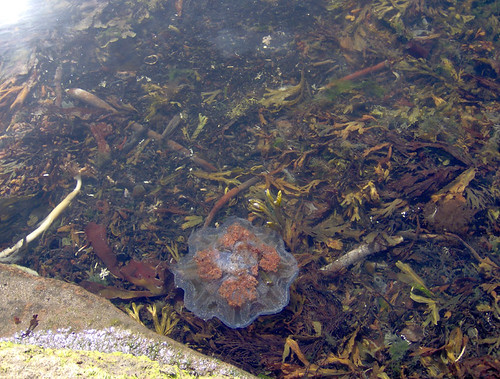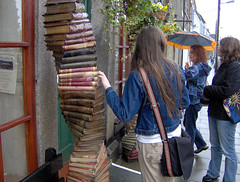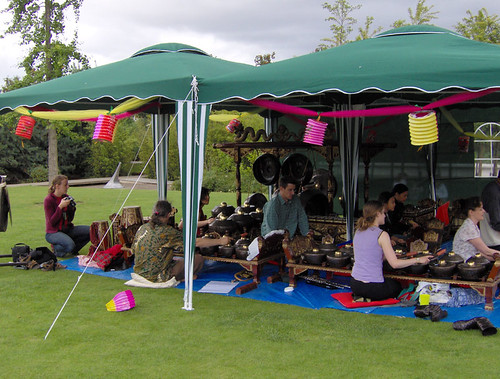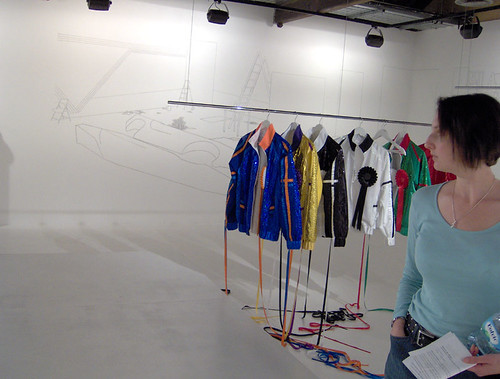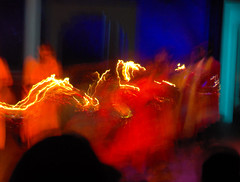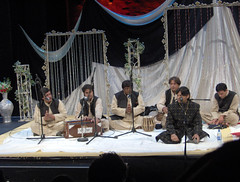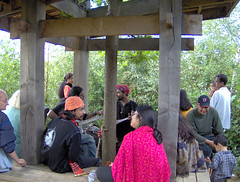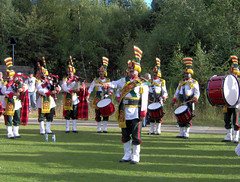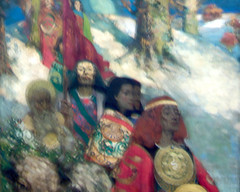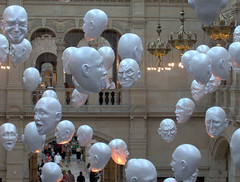Friday, September 29, 2006
Title:Extremes Along The Silk Road
Author: Nick Middleton
Publisher:
Nick Middleton is a Geography lecturer at Oxford University. Between term times he likes to travel. To experience Geography first hand. This is his seventh travel book, following from his third television documentary. Increasingly Middleton is interested in extremes, in this case along the Silk Road, what he describes as the world's oldest super highway. The Silk Road was key to trading between Europe and Asia, for the flow silk, paper, salt, spices and rhubarb (which apparently was so popular and had so many uses, it could just as easily have been the Rhubarb Road).
The road is bordered by extreme territories, where nomads live, in a manner not so different from how they lived all those generations ago. On this journey Middleton joins the nomads and observes their life style. travels to the most extreme territories to find people still living there regardless. Through Mongolia, Tibet and ending in Kazakhstan.
Middleton has set himself a series of key steps, and to a degree how he manages is very much on the fly. Journeys with archaeologists, pilgrims, fellow geographers, ex-army; by motorbike, jeep, micro light, or camel. He moves through the Gobi with yak farmers. Enters the Badan to find mega dunes, the biggest sand dunes in the world - scaling one taller than the Eiffel Tower in hours with an Austrian explorer, descending in minutes. Exploring underground water channels that maintain oasis towns using 1000 year old technology. Going on Tibetan pilgrimages at an extreme altitude of over 5000m above sea level. In Mongolia he searches for pre-historic horses, while in Kazakhstan he looks for the horses that the Chinese believed had come from Heaven. Explaining how Genghis Khan had attempted to trade with the Kazakh city of Ottar, how Ottar killed his ambassador, leading to the city's decimation by a furious Mongol horde. He speculates as to whether Marco Polo brought pasta to Asia or from Asia to Italy.
After visiting natural extremes he completes his journey with a visit to a man made extreme. The Aral Sea was huge, twice the size of Belgium. In the last century everything changed, Soviet plans for feeding millions, turning the steppes into fields irrigated by the Aral turning badly wrong. Draining the sea, putting fishermen and villages out of work, splitting the sea into it's current state of Big Aral and Little Aral. Even worse, in the middle of the sea lay Rebirth Island, which at the height of the Cold War was used by Russia for weapons testing. Not it is an island no longer, and it is still contaminated.
Through out his travels Middleton is driven to face his fears, to experience the things that fascinate him, that he teaches about but has never seen. He doesn't like heights, yet there he is up a colossal sand dune, or hanging from a rope at the top of a deep well. Despite the fact that he can barely breath, that each step is a struggle, he continues to walk round a mountain in Tibet. Despite Anthrax and a real terror of dying on a contaminated ex-Russian test site, he keeps on going. This takes a mixture of humour and determination, but all along he retains a certain bumbling, enthusiastic charm, untainted by any excess of machismo, even if he does sometimes admit that it is entirely pride that keeps him doing something he really doesn't want to.
Mongolia, Tibet and Kazakhstan are obviously off the track a bit for your regular travel book. But with the combination of key history, with exotic and extreme locations Nick Middleton's book makes for fascinating reading.
Title:Bangkok Tattoo
Author: John Burdett
Publisher:Corgi Adult
Bangkok Tattoo is John Burdett's fourth novel, a sequel to Bangkok Eight, which was his real breakthrough work. A British lawyer working in Thailand, he returns to Bangkok and his Buddhist police officer. A devout believer, the token good cop in a Bangkok's corrupt district 8. After Bangkok 8, JS's ex-whore mother has opened a brothel, The Old Man's Club, with JS's boss, Vikorn, the head of district 8. The core of Bangkok Tattoo comes from the murder of an American, an American who is clearly an undercover CIA Agent. With the main suspect being Chanya, The Old Man's Club's prize worker, JS is assigned the job of cover up.
But in a post-911 Thailand, a country with its own struggle against Muslim insurgents, it isn't long before representatives of an Imam from the town the CIA were working in, turn up, concerned that they will be blamed. Followed by CIA Agents keen to find someone to blame. Though as more and more comes out about the dead agent, more and more questions are raised.
Burdett writes an eminently readable crime novel, rich in the exotic scenery of Bangkok. With JS he has a strong and dramatic narrator that keeps the story zipping along. However for all its readability and being fun, Bangkok Tattoo isn't as good as Bangkok Eight. JS becomes increasingly over familiar, verging on becoming a caricature as he repeatedly addresses an ignorant audience. There are also too many references to the previous novel, giving away much of the plot of Bangkok Eight. However as long as you keep a steady pace and don't spend too much time thinking there is enough good stuff here to make Bangkok Tattoo worth reading. With the subplot regarding the struggles between police and army taking on an extra relevance, given the recent Thai military coup.
Title:Hormone Jungle
Author: Robert Reed
Publisher:Orbit
Luscious Chiffon is a flower. A synthetic human. An engineered sex toy. But she isn't a normal flower. Part of a plot to rip off a fabulously rich gangster - Chiffon has a human soul. However that is a greedy soul, prepared to betray the "magician" who put the plan together in the first place. However in Brule City, flowers are not particularly common and Chiffon is going to be in trouble pretty quick if she doesn't find some help.
Enter Steward, a veteran of the Freestate Wars. A bloodless war fought with pain. Steward being the best of his generation, though with a problem that has driven him from his home town of Yellowknife to Brule. Steward is willing captivated by Luscious, and willing to take the fight to crime lord Dirk and his bodyguard Minus.
Hormone Jungle is, I believe, the first novel by Robert Reed, which to a degree shows. It is a mish mash of a novel, dense with races and planets, and layers of detail. Throughout the novel Reed continually changes narrator, switching from character to character, with each trying to out think and betray everyone else. Reed uses this technique to carefully set up his climax. But along the way we never really feel anything for the characters - they are too busy being manipulative or gullible to be particularly likeable or engaging. Hormone Jungle isn't necessarily a bad novel, but I've certainly enjoyed Reed's more recent material than this one.
Wednesday, September 27, 2006
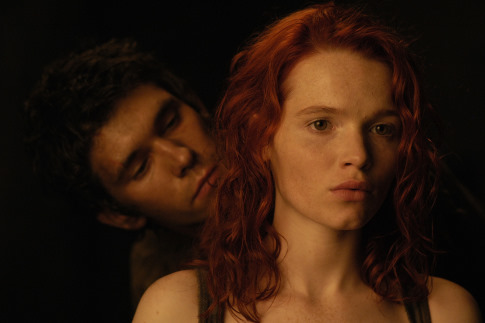
Title:Perfume - The Story of a Murderer
Cast: Ben Whishaw, Dustin Hoffman, Alan Rickman, Rachel Hurd-Wood
Director: tom Twyker
Jean-Baptiste Grenouille is born, where his siblings died, in the dankest, foulest fish market of Paris. With that first breath he awakens his first sense, and from that point on he has the most incredible power of smell. Every scent is something to be savoured, Jean-Baptiste is not one to discriminate, at least not at first. Raised in an orphanage, sold to a tannery, life is hard. The first time he is taken into town properly, to make a delivery for the tannery, he has his head turned by a multitude of new smells. But through all this cuts one smell - that of a beautiful young woman. In his attempts to explore the full extent of this novelty, he manages to inadvertently kill the woman. But Jean-Baptiste is an obsessive, and he doesn't realise what he has done, merely that he has lost the smell that fascinated him.
It is about the same time that he learns about the art of the perfumer. Men who capture and retain scents. If Jean-Baptiste is to find some way of capturing and keeping a woman's smell forever, then he must become a perfumer! Demonstrating his phenomenal olfactory capability to an old master, he is taken on as an apprentice. Jean-Baptiste hungers for knowledge, hungers for ability, and with each new technique he advances his art a little more. When he spots a young Lady, another flaming red head to remind him of that first girl, he knows that she will be the height of his art. And so, the murder begins.
Perfume is based on the novel by Patrick Suskind and has the subtitle of "the story of a murderer". In the voice over at the start of the film, and in the introduction to the novel, Jean-Baptiste is painted as being incredibly evil. Certainly from the start he is a jinx, death rippling out from contact with the young man. But even when he starts to take an active approach to death, he does so in a detached and obsessive manner, having more of the idiot savant to him than the frenzied slasher. Yet as he perfects his technique of distilling the essence of woman, he leaves terror in his wake - naked, scalped bodies abandoned for people to discover.
Perfume is the second English language film by German director Tom Twyker, following on from Heaven. Twyker really made his mark with his second film Run, Lola, Run, which also gave the world an iconic red head to fixate on. Perfume is quite a departure from the director's normally contemporary work, but it has his eye for detail, his technique in bringing his story to life. France before the discovery of soap is presented is a reeking mire, and the fetid, ugly detail the camera pans across brings that to life. At the same time there is sumptuous beauty, particularly with Jean-Baptiste's two redheads, luminous women.
While I was aware of the novel Perfume and that there was a film adaptation in the works, I admit I had not read the novel, and didn't really know much about it. However finding myself in Zurich while it was showing, and that it had been directed by Twyker I had enough trust in his ability that I knew it would be worth seeing. And he doesn't disappoint, Perfume is magical.
Title:Princess Raccoon [Operetta Tanuki Goten]
Cast: Ziyi Zhang, Jô Odagiri, Hiroko Yakushimaru, Mikijiro Hira, Taro Yamamoto, Hibari Misora
Director: Seijun Suzuki
Lord Azuchi Momoyama is the fairest of them all, his advisor and their scrying pool tells him so. But he is a bad man, treats people as furniture, and will lash out at all who stand in his way. So when the pool suddenly suggests that Amechiyo, Azuchi's son, will become the fairest of them all, something must be done. The prince is abducted by a ninja, and taken to the mysterious mountain, where all who climb it become lost forever.
However things do not go to plan. The mountain is home of the Tanuki, raccoon spirits. At the foot of the mountain, the ninja is attacked by a local farmer, who has mistaken him for a Tanuki and intends to make Tanuki soup. This leaves Amechiyo at the foot of the mountain, in Tanuki territory, and when he awakes from his drugged sleep he encounters a beautiful young woman. It quickly becomes clear that she is in fact a princess, and the banished prince falls in love. But she isn't human, and man and Tanuki should never fall for each other. However it is the time of the 13th moon, and anything can happen.
Princess Raccoon is a musical, a comedy, a rock opera, a bemusing anomaly. Zhang Ziyi (Crouching Tiger, House of Flying Daggers, Hero), plays the part of the Tanuki Princess, the only Chinese performer in a Japanese film. Though that is explained, since she is a princess from another land, and through magic the Japanese prince can understand what she says. For the most part the film is performed in front of sets as though it were on stage, though at times there are out door scenes with live action. Musically we veer from traditional Japanese operetta to psychedelic seventies rock opera. There is even a computer animated character, the princesses side kick, a mischievous bat/raccoon/ball thing?
Princess Raccoon is by turns striking and bemusing, and on the whole is completely baffling, leaving the viewer quite uncertain as to what to make of it at all!
Title:A Scanner Darkly
Cast: Keanu Reaves, Robert Downey Jr., Woody Harrelson, Winona Ryder
Director: Richard Linklater
Fred is an undercover police, actively combating the supply of the drug Substance-D, which is sweeping across America. In a surveillance age calls are monitored, people are watched, and agents are placed within groups of friends. With the use of scramble suits no one but the agent knows who they really are. This makes Fred ideally placed to monitor Bob Arctor when the technology suggests he might be a key step in the Substance-D chain. Bob and his friends are all users, and Fred has to use as well to maintain his cover. But Substance-D is powerful stuff, incredibly addictive it quickly causes brain damage. Signs of which Bob and Fred are both exhibiting, something that is proven by the fact that Fred sometimes has problems remembering that he actually is Bob.
A Scanner Darkly is the latest film to be adapted from the works of Philip K. Dick, a science fiction writer who's work has been plundered by Hollywood on numerous occasions. Most successfully in the form of Blade Runner, and perhaps most embarrassingly in the form of Paycheck. Director Richard Linklater has taken an unusual approach to this adaptation though, which shouldn't be a surprise with someone like Linklater, he has gone for a pretty faithful version.
While Linklater may have gained a higher profile in recent years thanks to his more commercial efforts, he has a reputation for the more free form rambling production. Which is what Scanner Darkly is for the most part, the bulk of the film is comprised is junkie talk, the paranoia and delusions of the drug addled and how the bend the world to fit in with that. To capture some of that sense of shifting reality, and the weirdness of the scramble suit, Linklater decided to film Scanner with his cast and then use animation to finalize the sensation. The animation extends from the techniques developed for his earlier film Waking Life, itself featuring a conversation about Philip K. Dick and his perception of reality.
The film Scanner Darkly that results is a curious thing. In some ways it is astounding novelty, an adaptation of a Dick novel that bears some resemblance to the original material. Which is something of an unsettling proposal. The animation is a glitchy shifting thing, and particularly cartoony and unstable when it comes to the scramble suits. On first viewing, I felt that I kind of liked the film, though I also had a certain restlessness, a certain uneasy feeling that it wasn't entirely living up to expectations. On second viewing however, I felt a lot more comfortable and was able to appreciate the film a lot more, enjoying the humour and absurdity the way it should be enjoyed.
To a large degree, this is how Philip K. Dick's work should be done - a near future setting that isn't so far from the present, that has a certain grimy feeling, a certain paranoid feeling, a certain feeling that messes with your head.
Tuesday, September 26, 2006
Title:Children of Men
Cast: Clive Owen, Julianne Moore, Michael Caine, Chiwetel Ejiofor, Claire-Hope Ashitey, Pam Ferris, Danny Huston, Peter Mullan
Director: Alfonso Cuarón
Children Of Men starts with the death of Baby Diego. Stabbed to death after he refused to sign an autograph. A celebrity in a world where women have stopped having children, where Diego is the youngest person on the planet, the last person born. The world has been in chaos, getting worse over the last 18 years. But while cities burn around the world, Britain remains strong through draconian rule and near martial law. Locking up every immigrant, checking ID cards, and police on every corner isn't enough though. With the death of Diego being the latest tragedy, but Theo isn't impressed, as everyone around him mourns, all he can think of is how much of a wanker Diego was anyway.
Theo takes a time out, retreating from the mass hysteria, to stay with his hippy friend Jasper out in the country. They smoke some dope, listen to loud music, and eventually he returns to London in a more relaxed manner. But no sooner has he returned than he is snatched by the Fishers, an anti-government terrorist organisation. That just happens to be led by his ex-wife, who is looking for a favour. Theo was an activist when he met Julien, but has been worn down by the system. Despite his reluctance, he decides to do what he can to help, though is quickly drawn in deeper than he planned. With things very quickly getting out of hand when he realises that the favour involves a miracle that might just change everything.
From the little I know of P.D. James, I would never have guessed that the film Children of Men was based on one of her novels. A writer of thrillers rather than science fiction, but science fiction this is. The film adapted and directed by the Mexican director Alfonso Cuarón, who has established a definite reputation and a diverse portfolio over the last few years. Cuarón made his debut with Y Tu Mama Tambien a comic road movie with political asides and tragic undertones. Somehow from that he was selected to direct the third Harry Potter film, The Prisoner of Azkeban, probably the darkest and most interesting of the Potter films today.
Cuarón's Children of Men is a bleak and gritty near future affair, starting with a Blade Runneresque London. That gets bleaker as it goes on: explosions in the streets, detention cages in every station, garbage piling high, livestock burning, beatings, murders, brutality. One review I read after seeing the film suggested the issues of terrorism, environmentalism and immigration are all news and that perhaps Cuarón is out of touch, I wonder what world they are living in? The suggestions that Children Of Men is too bleak may be more valid, at times it is chokingly bleak, but edges of humour shine through, taking the edge of the tension periodically.
Clive Owen is the real star of this film, even with smaller parts by the likes of Michael Cane, Julianne Moore, Chiwetel Ejiofor, Danny Huston and Pam Ferris. Owen is sometimes over rated, if likeable. But here he shines. He does the cynical dead pan and hard bitten that he always does so readily, but also exhibits a fragility and determination.
Often science fictions films are action films in disguise, a back drop for the tired formula of people running about and things blowing up. There are a handful of memorable films, which have a greater depth without necesarily being effects heavy productions that most people will think of as science fiction. Children of Men fits in there with films like Gattaca, Code 46 and perhaps for its apocalyptic flavour Time Of The Wolf. Children Of Men is not perfect, but i'd be hard pushed to think of something that was. I thoroughly enjoyed this film - beautiful, stunning, and memorable.
Title:RED DUST: A PATH THROGUH CHINA
Author: MA JIAN
Publisher: VINTAGE EAST
In the early 1980's Ma Jian was moved to Beijing because of his ability as a photographer, where he was employed in the foreign propaganda department, promoting the greatness of China. Unfortunately this separated him from his wife and daughter - his wife taking another lover, getting divorced and preventing him from seeing his daughter any more. His own lover starts to cheat on him just to make matters worse. Ma Jian is a poet and a painter, and partakes of secret meetings with other artists. But this kind of thing is frowned upon, as is his individual attitude at work. When he catches wind that it is likely he will be arrested for spiritual pollution he decides its time to leave.
Thus starts his 3 year journey round China. Recently having taken Buddhist vows, he wants to travel around great Buddhist sites, to try and understand the religion and see whether he can attain his own enlightenment. With forged documents, friends, and friends of friends, Ma Jian manages to move around and to survive. Along the way he takes pictures, writes stories and articles, and increasingly becomes interested in the people of China. Along the way he falls in and out of love, has near death experiences, gets arrested and escapes.
Red Dust is as the subtitle suggest "a" path through China. With which it isn't what you would perhaps call a traditional travel book, Ma Jian's path is rambling and very much as the mood or necesity takes him. The delay to his Tibet trip being one of the prime examples, as his camera is stolen, he clubs the culprits over the head and gets on the first bus out of town. To a degree this is more a snapshot of a nation, a nation under what seems to us strange rule - where movement and thought is controlled by the government, where technology and western influences creep into the cities while people live in abject poverty, centuries old life styles turn around by the dictation of Mao.
The most frustrating thing about Red Dust is that is doesn't have Ma Jian's pictures. Each section has a scribbled map. But he must have had 100s of pictures by the end of his travels, even apart from the films that were lost in various misadventures. To have seen what he saw would really have brought his words to life.
Sunday, September 10, 2006
MP3 Title: Watch That Roundabout Ben
Artist:Gaye Bykers On Acid
I always mean to post more music, more about music. So here is a Gaye Bykers MP3 that I just came across, a classic album, lots of fun. Besides which, I am off, like anyone will notice with recent underposting. Off to Zurich for a week, 11/9 to 17/9.
In the meantime, Vikings tried to invade Scotland in 1263, shockingly they tried again yesterday, it didn't go to well for them, they were seen off by King Alexander's army and their boats were burnt:
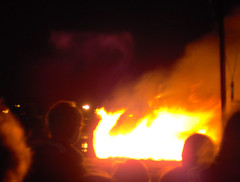
 this is the voice of re:mote induction.
this is the voice of re:mote induction.
